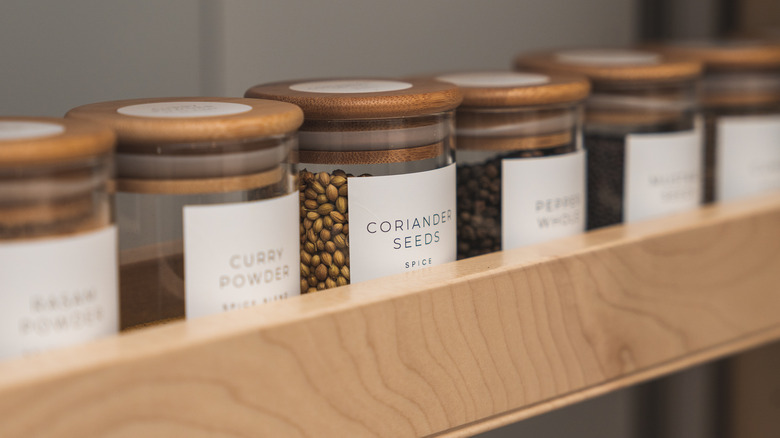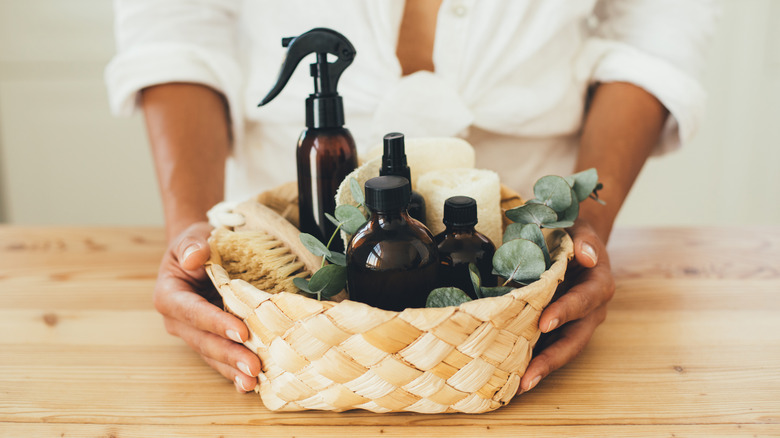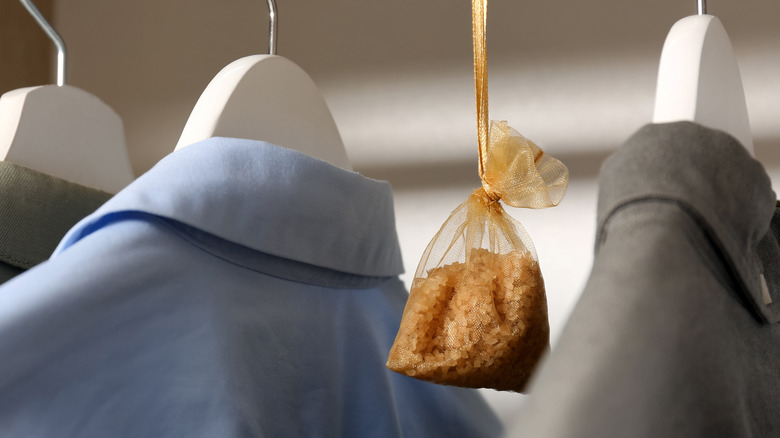3 Creative Ways To Use Your Expired Spices And Seasonings In Your Home
Have you ever bought spices for a new recipe you want to try, only never to use them ever again? Now you're decluttering your kitchen and going through the spice cabinet to check all the expiration dates, and it turns out you have a whole bunch of expired and hardly used seasonings. It feels too wasteful to throw them in the trash, but what can you do with expired spices?
Condiments aren't like other cooking products because when expired, they aren't suddenly harmful and won't make you sick if you cook with them (via Treehugger). Spices lose their potent flavors over time, but they can still be very useful in the home and even in cooking. You can keep them in your cabinet and maybe just use a little bit more in your recipe, or you can go for any of the ideas below to find usage for them throughout your home.
1. Cleaning supplies and natural pesticide
If you hate the smell of all those chemicals in store-bought cleaning products, you can use the expired spices in your cabinet to make your own maintenance supplies. It's easier than you think, and it's much safer to use these options, especially in areas of the home where your food comes in contact with the surface, such as kitchen counters and dining tables. First, add white vinegar to a spray bottle and mix in either thyme or lavender. Over time these spices will infuse with the vinegar, and then you can spray surfaces with this solution and wipe away germs and dirt (via Turning the Clock Back).
You can also use spices such as mint, rosemary, garlic, lavender, thyme, bay leaves, basil, and garlic to keep pests away. Take the expired condiments and sprinkle them around the home where you've noticed pests. This method can work on mice, ants, and other insects such as roaches. Lastly, you can also use expired chili pepper, cayenne pepper, and red pepper flakes in your veggie garden to protect them from deer, rabbits, or squirrels. Use a mixture of these spices or just one, whatever you have on hand.
2. Use them on and around your plants
Spices are filled with vitamins and minerals that we benefit from when used in our foods, and plants need those same vitamins and minerals to grow happy and healthy, Blending Colorado Spice Company notes. However, for greenery, it's best to use leafy spices such as thyme, rosemary, oregano, and bay leaves. Sprinkle this blend onto the soil, both inside and outside of your home to add some nutrients for the cultivars to thrive beautifully.
According to Treehugger, you can also make a non-toxic fungicide to spray on your plants to protect them from life-threatening fungus infections. A mixture of cinnamon and water left to sit overnight and then strained can be put in a spray bottle. Then you can use that sprayer to apply the mixture to the leaves and stems of your plants. The solution can be used as a preventative or treatment for plants showing signs of distress.
3. Spice up your home scents
As soon as the leaves begin to turn, many people bring out their fall candles and start enjoying the spicy scents of pumpkin and cinnamon. However, candles can trigger allergies and aren't great for air quality within the home (via Conditioned Air Solutions). So what do you do to get those iconic fall smells in your home? Expired spices can work perfectly. Treehugger recommends putting about 1 tablespoon in boiling water and enjoying the scent throughout your home. This scenting method is known as potpourri.
If you have pets, you might notice your carpet or rugs smelling a bit funky after a few months. You can use expired spice here too. Shake a small amount over the carpet before you vacuum, which will freshen up the smell (via Blending Colorado Spice Company). Just be sure not to use any seasoning that might stain the fibers of your rugs or carpets.
Ever pull out your sweaters as the weather cools to find them smelling musty and stale? Use those old spices and make your own sachets (via Treehugger). These sachets can be placed all over the home, including in drawers with clothes, hanging in a closet, and even in your car. They are an excellent way to make everything smell great without using harsh chemicals.



